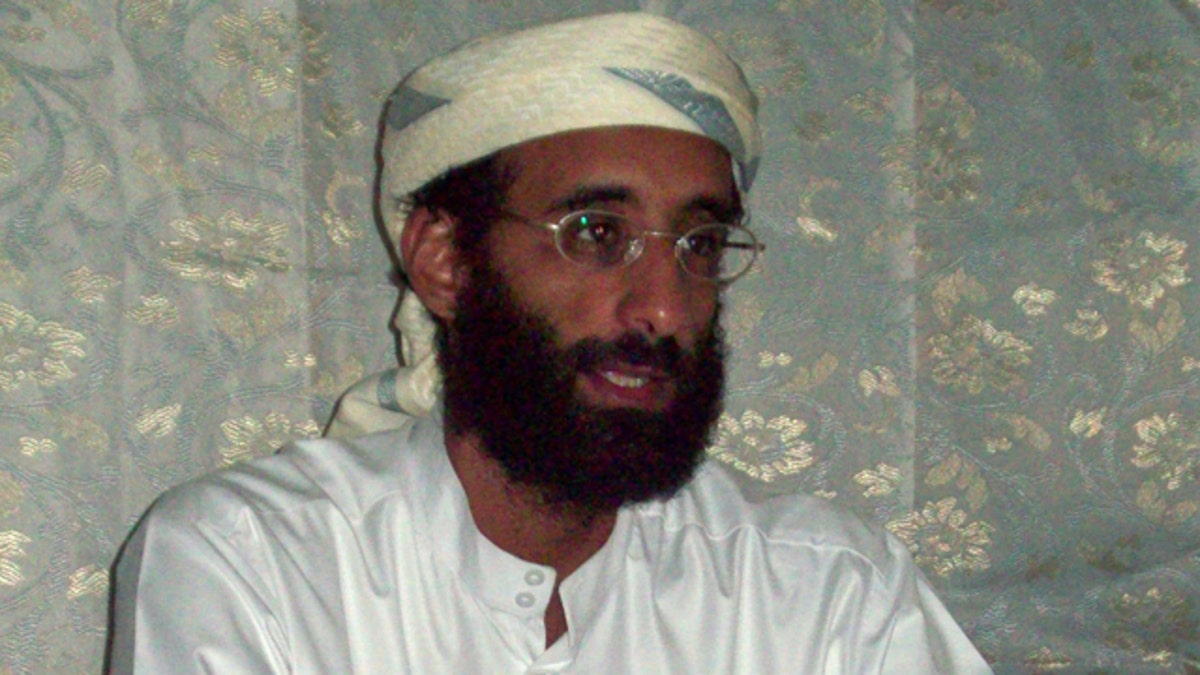
This Oct. 2008 file photo by Muhammad ud-Deen shows Anwar al-Awlaki in Yemen. (AP)
Newly released documents further support the conclusion that the FBI was working with radical cleric Anwar al-Awlaki after the 9/11 attacks – in the years before he became the first American targeted for death by a U.S. drone strike.
As part of an ongoing investigation of the cleric that began after the 2009 Fort Hood shooting massacre, Fox News was first to report that in 2002, al-Awlaki was released from custody at JFK International Airport -- despite an active warrant for his arrest -- with the okay of FBI Agent Wade Ammerman.
Watchdog group Judicial Watch has since obtained more than 900 pages of new documents in the course of its federal lawsuit against the FBI under the Freedom of Information Act. They show the cleric was emailing and leaving voice messages with an FBI agent in 2003, a year after Ammerman told customs agents at JFK airport to bypass an outstanding warrant for the cleric's arrest.
The documents further support claims that Awlaki, who eventually went overseas and linked up with an Al Qaeda affiliate, worked with the FBI and was likely a U.S. government asset.
"I have little doubt that President Obama assassinated a terrorist that was an asset of the U.S. government," Judicial Watch President Tom Fitton said.
He added: "There have been so many missed opportunities in getting the bad guys, but it's one thing to have a bad guy working with you and for you and actually in your custody and then letting them go."
Fitton questioned whether Obama was even aware of al-Awlaki’s connections to federal law enforcement. “These unanswered questions cast President Obama's decision to assassinate [al-Awlaki] in a disturbingly different light," he said.
In one Oct. 2, 2003 email, an FBI agent whose name is redacted writes to a colleague regarding a voicemail: "Holy crap, [redacted] isn't this your guy? The aman (imam) with the prostitutes.”
Three weeks later, after leaving another voicemail, the cleric uses his personal Yahoo account to write directly to an FBI agent, now stationed at the FBI Academy in Quantico, Va., to complain about news reports linking al-Awlaki to the 9/11 hijackers.
"I was astonished by some of the talk circulating in the media about me. ... I am amazed at how absurd the media could be and I hope that the US authorities know better and realize that what was mentioned about me was nothing but lies," al-Awlaki writes, appearing to scold the FBI agent.
In another email, an FBI agent bristles at attempts by the 9/11 Commission to locate al-Awlaki and interview him independently, describing the requests as "numerous and unrelenting." The email says the 9/11 Commission wanted to talk to the cleric after it learned he had been phoning and emailing with FBI agents.
Significantly, the email traffic shows that while the 9/11 Commission was trying to find al-Awlaki, an FBI agent was in direct contact with the cleric and set up a meeting with him in March 2004.
"SA [redacted] has had a conversation with Aulaqi and has tentatively set up an interview for mid-March in London. With the VA. Jihad trial scheduled for early Feb. this will be the earliest SA (redacted) can meet Aulaqi … If the 9/11 commission needs to meet with Aulaqi, we will provide the contact information so they can set up their own interview."
Previously obtained records show that in 2002, within days of al-Awlaki’s re-entry to the U.S., he showed up in Ammerman's counterterrorism investigation in Virginia into Ali al-Timimi, who is now serving a life sentence on non-terrorism charges. On Oct. 22, 2002, 12 days after the imam's return, another FBI memo obtained through the Judicial Watch federal lawsuit (marked "Secret”) includes the subject line "Anwar Nasser Aulaqi" and "Synopsis: Asset reporting." The existence of the customs entry records was first documented by author Paul Sperry.
Asked about the FBI's involvement in al-Awlaki's release and whether the FBI tried to recruit the cleric, in a September 2013 interview with Fox News, then-FBI Director Robert Mueller did not deny it.
"I am not personally familiar with any effort to recruit Anwar al-Awlaki as an asset -- that does not mean to say there was not an effort at some level of the Bureau (FBI) or another agency to do so," Mueller said.
Mueller did not elaborate on a memo he personally sent then-Attorney General John Ashcroft on Oct. 3, 2002 -- seven days before the imam suddenly re-entered the U.S., was detained and then released at JFK Airport, by the order of Mueller's agent -- that is marked "Secret" and titled "Anwar Aulaqi: IT-UBL/AL-QAEDA."
It is not public whether al-Awlaki's contact information was provided by the FBI to the commission, but in the 9/11 report into the 2001 terrorist attacks, it states efforts to locate al-Awlaki were unsuccessful.
Fitton claims federal law enforcement had al-Awlaki in their custody, until the FBI let him walk -- and in the years before he was killed by a CIA drone in 2011, al-Awlaki pioneered the digital jihad, now being capitalized upon by the Islamic State, or ISIS.
"ISIS took that and ran with it -- who knows, maybe if we had gotten al-Awlaki and kept him off the streets and in jail or in prison where he belonged that there would have been a much more slower development of the Internet jihad that we're all facing worldwide."
Catherine Herridge is the author of “The Next Wave: On the Hunt for Al Qaeda’s American Recruits"




